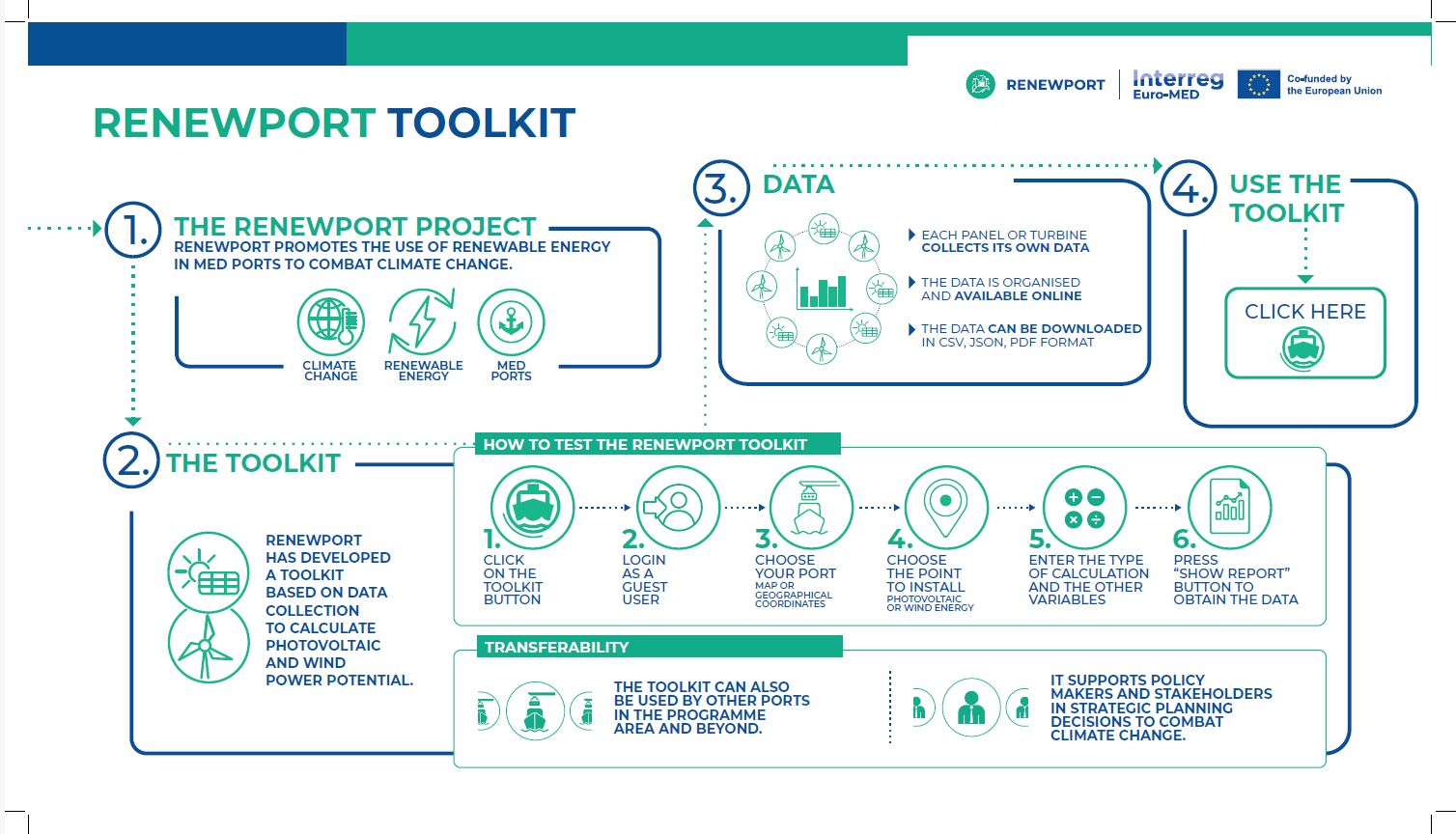Would you like to implement sustainable development projects in your area? We have good news, two of our projects have developed the decision-support tools you need: INFIRE, for project financing plans, and RENEWPORT, for renewable energy production in port facilities. Discover their tools and first results achieved!
RENEWPORT RES Toolkit: Setting Sail for the Energy Transition in Ports!
Did you know that maritime transport accounts for around 3% of global greenhouse gas emissions? And that port operations make up 10% of those emissions? Reducing them particularly through the use of renewable energy has become a top priority for ports aiming to decarbonize their activities and contribute to the fight against climate change.
To this end, the RENEWPORT project provides Mediterranean ports with a model that facilitates the development of their own renewable energy production.
In practical terms, the eight partner port authorities involved in the project have developed the RENEWPORT Renewable energy sources (RES) Toolkit: a platform freely accessible to all stakeholders – mainly port authorities, but also including citizens – enabling them to estimate potential wind and solar energy production within their port areas.
Its functioning is illustrated in the diagram below:

At this stage, pilot tests have already been carried out in several ports: “These tests demonstrated the toolkit’s effectiveness in guiding the adoption of renewable energy solutions, such as solar and wind power, and in fostering collaboration among port authorities, local governments, and energy providers” says Alberto Cozzi from the Port Network Authority of the Eastern Adriatic Sea. You can also find on the project’s website the test report as well as the evaluation provided by the participants in this pilot.
“For the first time, ports within the programme area joined a transnational partnership to collectively tackle these shared challenges” continues Alberto Cozzi.
It is worth noting that this toolkit is also open to citizens, with the aim of supporting their engagement and contribution to sustainable energy sovereignty in the Mediterranean region.
You would like to test the toolkit ? Click here to access RENEWPORT RES Toolkit !
INFIRE Financial and Economic Evaluation Tool: turning today’s financial plans into tomorrow’s achievements
In the Euro-Mediterranean region, many local authorities’ environmental projects face the challenge of navigating complex financing mechanisms. Indeed, these projects ‘involve multiple financing sources (European, national, private) and each has its own eligibility rules, reporting requirements and timelines’, explains Hrvoje Maras, INFIRE project coordinator at the North-West Croatia Regional Energy and Climate Agency (REGEA).
In practical terms, it simplifies decision-making by:
- Enabling local authorities to assess the financial viability of their project based on its technical characteristics and their financial situation.
- Calculating key economic indicators (payback period, economic rate of return, net present value), as well as the expected economic and environmental benefits.
- Offering a comparison between different financing options, thereby helping to strengthen future grant and funding applications.
The tool has already been tested on eight pilot projects of very different natures, highlighting its adaptability and replicability. These include projects such as the greening of schoolyards (France, Portugal), the replacement of old heating systems with heat pumps (Bosnia and Herzegovina, Italy), and various energy initiatives: installation of photovoltaic panels (Croatia), a mobility hub (Greece), a heating management system (France), and the establishment of an energy help desk for citizens (Bulgaria).
The initial feedback highlights tangible benefits. On a very practical level, local authorities appreciate the comparison between financial scenarios, which enables them to present high-quality financing plans that meet public funders’ requirements. Finally, “the integration of economic analysis in the tool allowed public authorities to make assessments of projects from the societal perspective and easily develop cost-benefit analyses, which are mandatory for public projects in some pilot countries,” notes Hrvoje Maras. In other words, the tool helps speed up decision-making, project preparation, and ultimately the transition from promises to action.
Stay tuned for the official launch of this tool, expected in 2026!


